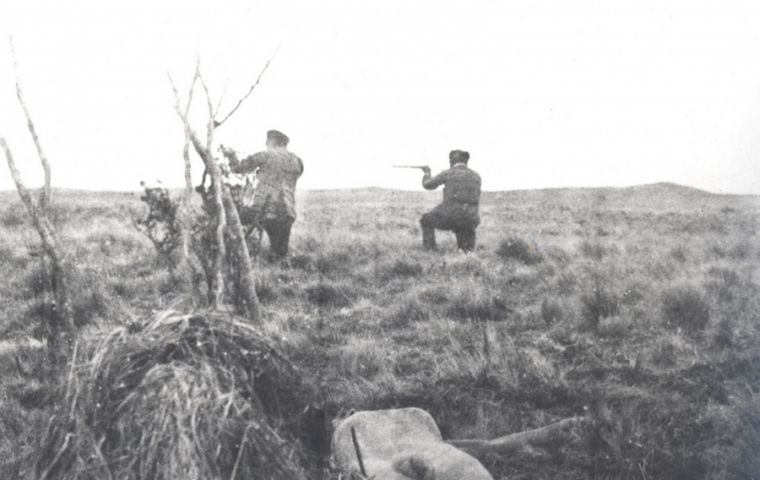MercoPress. South Atlantic News Agency
Tierra del Fuego soul searching: 25 November, “Day of Selk-nam indigenous people genocide”
 Precisely on a 25th November 1886 the first recorded massive killing of Selk'nam people took place.
Precisely on a 25th November 1886 the first recorded massive killing of Selk'nam people took place. The Tierra del Fuego provincial legislative has done some soul searching and has voted unanimously to declare next November 25, “Day of the Selk'nam people genocide.” It will be a day of provincial mourning with flags at half-mast and a non-working day in the extreme south province of Argentina.
The initiative was sponsored by the Green party and the chair of the Indigenous Peoples and recalls the brutal conquest of the Tierra del Fuego territory by Argentine troops, and precisely on a 25th November 1886 the first recorded massive killing of Selk'nam people took place.
The Argentine troops were under the command of Ramon Lista a military officer, explorer and governor of the neighbouring province of Santa Cruz.
The bill modifies previous legislation from September 1992 which had declared November 23, the “Day of the Tierra del Fuego Indigenous”.
The Selk'nam people was one of three indigenous tribes populating Tierra del Fuego from the second half of the 19th to the early 20th century. The genocide spanned fifteen years. The Selk'nam, which had an estimated population of 4,000 people, saw their numbers reduced to 500. They inhabited the northeastern part of the archipelago and were also known as Ona (people of the north), by the Yamana. The Selk'nam had lived a semi-nomadic life of hunting and gathering in the Isla Grande de Tierra del Fuego for thousands of years.
The last full-blooded Selk'nam, Angela Loij, died in 1974. They were one of the last aboriginal groups in South America to be reached by Europeans. According to the 2010 UNESCO Atlas of the World's Languages in Danger, the Ona language, is considered extinct, as the last speakers died in the 1980s.
Selk'nam territory was plundered and conquered, while natives were plied with alcohol, deported, raped, and exterminated, with bounties paid to the most ruthless hunters. By 1930 they had been reduced to about 100.
German anthropologist Robert Lehmann-Nitsche published the first scholarly studies of the Selk’nam, although he was later criticized for having studied members of the Selk’nam people who had been abducted and were exhibited in circuses in conditions of de facto slavery.
The large ranchers tried to run off the Selk'nam, then began a campaign of extermination against them, with the complicity of the Argentine and Chilean governments. Large companies paid sheep farmers or militia a bounty for each Selk'nam dead, which was confirmed on presentation of a pair of hands or ears, or later a complete skull. They were given more for the death of a woman than a man. In addition, missionaries disrupted their livelihood through forcible relocation and inadvertently brought with them deadly epidemics.




Top Comments
Disclaimer & comment rules-

-

Read all commentsJust another Good reason to have Nothing to do with Argentina and its Blood Thirsty Ways.
Nov 20th, 2021 - 06:15 pm 0Bolsonaro's Brazil is killing indigenous people. And burning the forest. IBAMA no longer exists.
Nov 24th, 2021 - 06:07 pm 0Commenting for this story is now closed.
If you have a Facebook account, become a fan and comment on our Facebook Page!